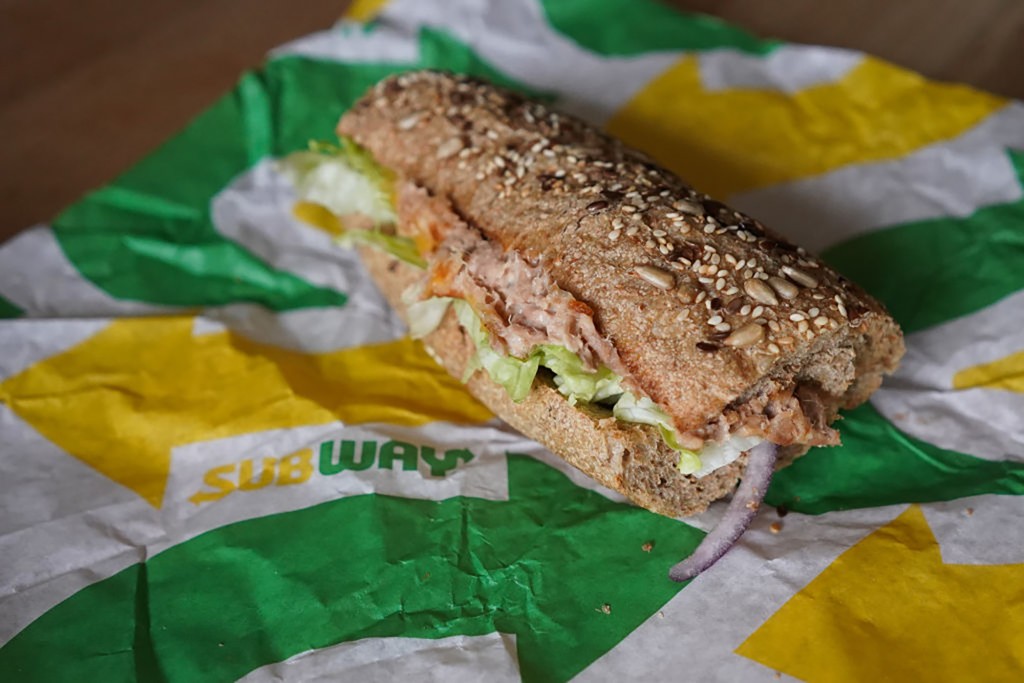The Subway meat mystery continues.
An amended lawsuit accusing Subway of duping the public about its tuna sandwiches now claims that the alleged mystery meat actually contains trace amounts of chicken, pork and cattle DNA, according to new lab tests.
It’s the third amended lawsuit filed against Subway this year by Karen Dhanowa and Nilima Amin in the federal court in San Francisco, near their homes in Alameda County.
The latest version, filed on Monday, said the two collected 20 tuna samples from 20 Subway restaurants in southern California and submitted them for testing at the Barber Lab at UCLA’s Department of Ecology and Evolutionary Biology.
Nineteen of the 20 samples contained “no detectable tuna DNA sequences whatsoever,” the lab found, according to the lawsuit.

And what’s more, all 20 samples contained “detectable sequences of chicken DNA,” according to the complaint, while 11 samples were found to have pork DNA and seven contained cattle DNA.
The alleged discovery of other animal DNA in the meat Subway purports to be tuna not only undermines the company’s marketing of “100 percent tuna,” but also opens up the sandwich chain to a host of potential ethical violations related to dietary and religious restrictions.
Dhanowa and Amin allege in the amended complaint that Subway stores across California do not take enough care to protect their tuna supply chain, where contamination could occur.
“Defendants do not take sufficient measures to control or prevent the known risks of adulteration to its tuna products. On the contrary, they actively perpetuate actions and steps that encourage mixing or allowing non-tuna ingredients to make their way into the tuna products,” the lawsuit contends.

Subway, for its part, has gone to great lengths to defend the integrity of its tuna sandwiches. Since the initial lawsuit in January, Subway launched a new page on its website declaring, “SUBWAY TUNA IS REAL TUNA.”
A spokesman for Subway bashed the latest lawsuit and insisted that “Subway tuna is high-quality, wild-caught, 100 percent tuna.”
“The plaintiffs have filed three meritless complaints, changing their story each time. This third, most recent amended claim, was filed only after their prior complaint was rightfully dismissed by a federal judge,” the spokesman said.
“Our legal team is in the process of evaluating the plaintiffs’ amended claim, and will once again file a new motion to dismiss this reckless and improper lawsuit. The fact remains that Subway tuna is real and strictly regulated by the FDA in the U.S., and other government entities around the world.”

The original lawsuit, filed in January, alleged that the meat was “bereft” of tuna. The second version of the complaint softened the allegations, claiming that the meat was not 100 percent sustainably caught skipjack and yellowfin tuna, as marketed.
US District Judge Jon Tigar dismissed the second version last month, saying the plaintiffs did not show they bought Subway tuna based on alleged misrepresentations, though he did not rule on the merits of the case.
Outside of the courts, at least two news outlets have conducted testing of their own in an effort to solve the meat mystery.
In June, the New York Times commissioned its own commercial lab tests of various samples of Subway tuna, and it found that there was no “amplifiable tuna DNA” in the samples.
The following month, Inside Edition had three samples of the meat tested and found that all had tuna in them.
